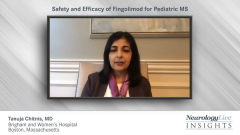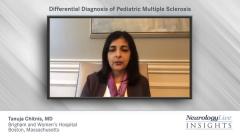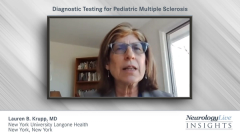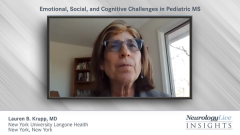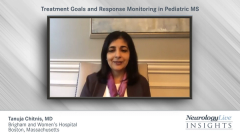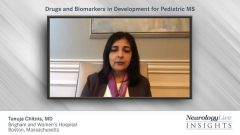
Clinical Presentation of Pediatric Multiple Sclerosis
Lauren B. Krupp, MD provides insight into the signs and symptoms of multiple sclerosis and emphasizes differences in clinical presentation between adult and pediatric patients.
Episodes in this series

Lauren B. Krupp, MD: Individuals in the pediatric age group who have MS [multiple sclerosis] have the same disease that adults with MS have, but they differ in certain ways. Particularly, those in the pediatric age group relapse more frequently; they have more inflammatory lesions, and they accumulate lesions more frequently. It’s not unusual for patients before they come to clinical attention to have more than 1 clinical event. Sometimes when they’re treated with a disease-modifying therapy, depending on what that is, they may have several relapses even while on treatment.
One of the interesting challenges among those with pediatric MS are the youngest patients. The majority of children are in the adolescent age range, but there are a number who are also quite young. The youngest patient I ever saw was 27 months old when I made the diagnosis. Children in that age group and in the preteen years are more likely to have an ADEM [acute disseminated encephalomyelitis]-like presentation. They can present with encephalopathy or change in mental status or behavioral changes, and have lesions on the brain MRI that are large and fluffy. These patients are reclassified as multiple sclerosis when a second event occurs with characteristics of MS, for example. Another general characteristic is that the younger children tend to have more brain stem and cerebellar involvement as a rule. In the past, it has been stated that they’re a little less likely to have positive oligoclonal bands at a very young age. Whether this is still the case is unclear since so many patients who were diagnosed with pediatric MS are now recognized to have MOG [myelin oligodendrocyte glycoprotein] syndromes. Whether the CSF [cerebrospinal fluid] profile truly differs is a question that has to be readdressed.
The patients in the pediatric age group who present with MS often have symptoms that are similar to those of adults, but they can be overlooked. For example, a child may have optic neuritis but not say anything to their parents. It’s only when the second event of optic neuritis occurs in the other eye that the patient presents for clinical evaluation. Other clinical syndromes include problems with balance, dexterity, gait or walking, or strength. Patients can also have episodes of double vision, vertigo, symptoms referable to the brain stem or cerebellum. When these clinical events happen frequently, these relapses often are characterized eventually with recovery. One of the differences between pediatric patients with MS and adults is that fortunately, kids tend to recover very well from their clinical attacks. It’s not uncommon in a day where I’m seeing only pediatric patients with MS for most of those children to have normal or nearly normal neurologic exams. In contrast, in the adult MS group, you might have patients using a cane or with much more obvious neurologic impairment.
We and others have been concerned about the cognitive well-being of kids with MS; after all, pediatric patients with MS are in a living laboratory. They’re in school; they’re in the process of learning the tools that they need to become independent adults. Whether MS can affect their cognitive functioning has been a big question, and one of great concern. Similarly in the same vein, adolescents in particular want to be like their friends. Anything that makes them different can be a source of emotional challenge. Sometimes kids with MS have problems related to mood disturbance. Most of the studies that have looked at cognitive functioning in pediatric MS have shown that there’s some slowing on cognitive processing speed relative to pediatric controls. More recently, we think that with early diagnosis and prompt initiation of disease-modifying therapy, those cognitive deficits may be less common. It’s estimated that between 25% and 30% of those in the pediatric MS age group might have some either cognitive slowing on speed at task or other cognitive changes relative to published norms. Again, more studies have to be done with healthy controls to see if those prior reports are still holding true. We’re somewhat hopeful that in the modern era, there may be less cognitive impairment than was previously thought. That isn’t to say that kids don’t have cognitive challenges, academic issues, or emotional stress. Early identification of cognitive involvement is really important. There fortunately are a variety of screening methods in which that can be done, even in the neurologist’s office.
Transcript Edited for Clarity
Newsletter
Keep your finger on the pulse of neurology—subscribe to NeurologyLive for expert interviews, new data, and breakthrough treatment updates.

